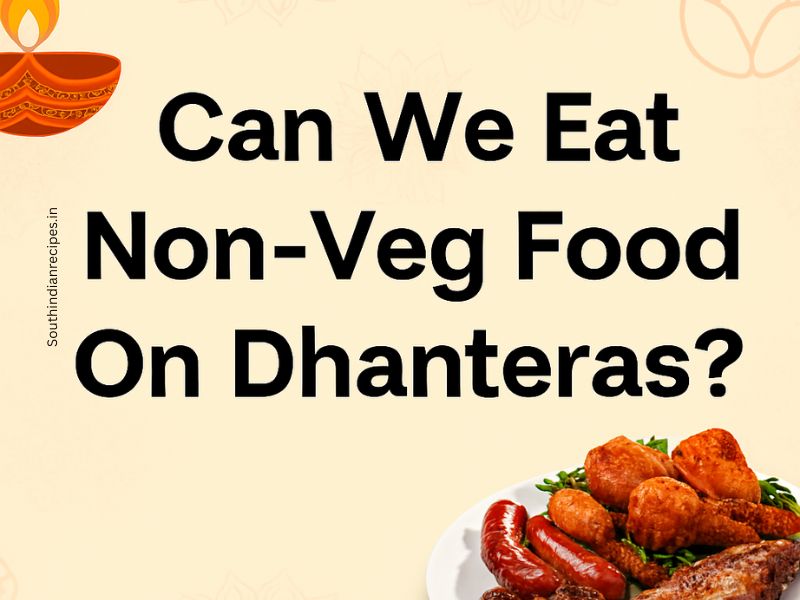Dhanteras marks the beginning of the five-day Diwali festival and is celebrated with devotion, prosperity rituals, and the purchase of gold, silver, and utensils. But as food habits evolve and cultural boundaries blur, many wonder: Can we eat non-vegetarian food on Dhanteras? Is it a religious taboo or a personal choice? Let’s explore this question through the lens of tradition, regional practices, and modern lifestyle.
Contents
What Is Dhanteras & Why It Matters?
Dhanteras, also known as Dhantrayodashi, falls on the 13th day of Krishna Paksha in the month of Ashwin. It is dedicated to Lord Dhanvantari, the divine physician and an incarnation of Lord Vishnu, who emerged from the Samudra Manthan carrying the pot of Amrit (nectar of immortality).
On this day, people:
- Worship Dhanvantari for health and well-being
- Buy precious metals and kitchenware as symbols of prosperity
- Light diyas to welcome Lakshmi, the goddess of wealth
It’s considered an auspicious day, and many families observe rituals with purity and devotion.
The Non-Veg Debate: Tradition vs Modernity
Traditional Beliefs
In many Hindu households, especially in North India, Dhanteras is observed as a sattvic day—meaning food is kept pure, vegetarian, and free from onion and garlic.
- Eating non-veg is generally avoided as it’s believed to disturb spiritual vibrations.
- Rituals are performed with clean minds and bodies, and vegetarian food is seen as more conducive to that state.
🌍 Regional & Cultural Variations
India’s diversity means practices vary:
- In Bengal, Odisha, and parts of Kerala, non-vegetarian food is often part of festive meals—even during Diwali.
- In Goa, Assam, and North-East India, meat and fish are commonly consumed during celebrations.
- In urban and cosmopolitan families, food choices are more liberal and based on personal preference rather than ritual.
🧠 Expert View
Religious scholars and cultural historians agree that there is no scriptural ban on eating non-veg on Dhanteras. The practice of avoiding it is more customary than doctrinal.
- The emphasis is on cleanliness, gratitude, and intention, not necessarily food type.
- If one chooses to eat non-veg with respect and moderation, it doesn’t violate any core spiritual principle.
What Should You Do?
If you’re wondering whether to eat non-veg on Dhanteras, ask yourself:
- Are you participating in puja or rituals that require sattvic food?
- Do your family traditions encourage vegetarianism on auspicious days?
- Are you hosting guests who may expect a certain type of meal?
- Do you want to honor the spirit of the festival through simplicity and gratitude?
There’s no one-size-fits-all answer. It’s about respecting tradition while honoring personal values.
Alternatives for the Day
If you choose to go vegetarian on Dhanteras, here are some festive dishes to enjoy:
- Paneer Butter Masala
- Kaju Pulao
- Aloo Dum with Poori
- Sweet Dishes like Kheer, Rasmalai, or Besan Ladoo
These can be just as indulgent and celebratory as any non-veg meal.
Conclusion: It’s a Matter of Choice & Respect
While many prefer vegetarian food on Dhanteras to maintain spiritual purity, there’s no religious mandate against non-veg. It’s a matter of personal belief, family tradition, and cultural context. Whether you choose to eat non-veg or not, the essence of Dhanteras lies in health, prosperity, and gratitude—values that transcend dietary choices.







